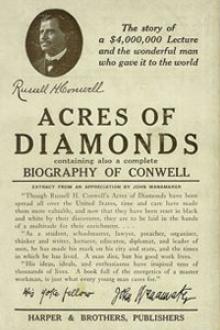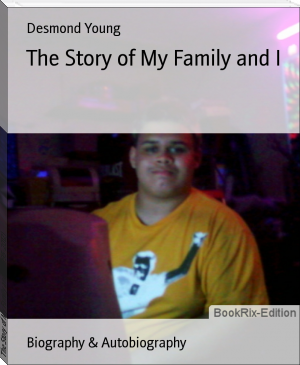Acres of Diamonds - Russell H. Conwell (big screen ebook reader .txt) 📗

- Author: Russell H. Conwell
- Performer: 1599869802
Book online «Acres of Diamonds - Russell H. Conwell (big screen ebook reader .txt) 📗». Author Russell H. Conwell
Never, for example, was there such an organizer.
In fact, organization and leadership have always been as the breath of life to him. As a youth he organized debating societies and, before the war, a local military company. While on garrison duty in the Civil War he organized what is believed to have been the first free school for colored children in the South. One day Minneapolis happened to be spoken of, and Conwell happened to remember that he organized, when he was a lawyer in that city, what became the first Y.M.C.A. branch there. Once he even started a newspaper. And it was natural that the organizing instinct, as years advanced, should lead him to greater and greater things, such as his church, with the numerous associations formed within itself through his influence, and the university—the organizing of the university being in itself an achievement of positive romance.
“A life without interest!” Why, when I happened to ask, one day, how many Presidents he had known since Lincoln, he replied, quite casually, that he had “written the lives of most of them in their own homes”; and by this he meant either personally or in collaboration with the American biographer Abbott.
The many-sidedness of Conwell is one of the things that is always fascinating. After you have quite got the feeling that he is peculiarly a man of to-day, lecturing on to-day’s possibilities to the people of to-day, you happen upon some such fact as that he attracted the attention of the London Times through a lecture on Italian history at Cambridge in England; or that on the evening of the day on which he was admitted to practice in the Supreme Court of the United States he gave a lecture in Washington on “The Curriculum of the Prophets in Ancient Israel.” The man’s life is a succession of delightful surprises.
An odd trait of his character is his love for fire.
He could easily have been a veritable fire-worshiper instead of an orthodox Christian! He has always loved a blaze, and he says reminiscently that for no single thing was he punished so much when he was a child as for building bonfires. And after securing possession, as he did in middle age, of the house where he was born and of a great acreage around about, he had one of the most enjoyable times of his life in tearing down old buildings that needed to be destroyed and in heaping up fallen trees and rubbish and in piling great heaps of wood and setting the great piles ablaze. You see, there is one of the secrets of his strength—he has never lost the capacity for fiery enthusiasm!
Always, too, in these later years he is showing his strength and enthusiasm in a positively noble way. He has for years been a keen sufferer from rheumatism and neuritis, but he has never permitted this to interfere with his work or plans.
He makes little of his sufferings, and when he slowly makes his way, bent and twisted, downstairs, he does not want to be noticed. “I’m all right,” he will say if any one offers to help, and at such a time comes his nearest approach to impatience. He wants his suffering ignored.
Strength has always been to him so precious a belonging that he will not relinquish it while he lives. “I’m all right!” And he makes himself believe that he is all right even though the pain becomes so severe as to demand massage. And he will still, even when suffering, talk calmly, or write his letters, or attend to whatever matters come before him. It is the Spartan boy hiding the pain of the gnawing fox. And he never has let pain interfere with his presence on the pulpit or the platform. He has once in a while gone to a meeting on crutches and then, by the force of will, and inspired by what he is to do, has stood before his audience or congregation, a man full of strength and fire and life.
VII HOW A UNIVERSITY WAS FOUNDEDTHE story of the foundation and rise of Temple University is an extraordinary story; it is not only extraordinary, but inspiring; it is not only inspiring, but full of romance.
For the university came out of nothing!—nothing but the need of a young man and the fact that he told the need to one who, throughout his life, has felt the impulse to help any one in need and has always obeyed the impulse.
I asked Dr. Conwell, up at his home in the Berkshires, to tell me himself just how the university began, and he said that it began because it was needed and succeeded because of the loyal work of the teachers. And when I asked for details he was silent for a while, looking off into the brooding twilight as it lay over the waters and the trees and the hills, and then he said: “It was all so simple; it all came about so naturally. One evening, after a service, a young man of the congregation came to me and I saw that he was disturbed about something. I had him sit down by me, and I knew that in a few moments he would tell me what was troubling him.
“ `Dr. Conwell,’ he said, abruptly, `I earn but little money, and I see no immediate chance of earning more. I have to support not only myself, but my mother. It leaves nothing at all. Yet my longing is to be a minister. It is the one ambition of my life. Is there anything that I can do?’
“ `Any man,’ I said to him, `with the proper determination and ambition can study sufficiently at night to win his desire.’
“ `I have tried to think so,’ said he, `but I have not been able to see anything clearly. I want to study, and am ready to give every spare minute to it, but I don’t know how to get at it.’
“I thought a few minutes, as I looked at him.
He was strong in his desire and in his ambition to fulfil it—strong enough, physically and mentally, for work of the body and of the mind—and he needed something more than generalizations of sympathy.
“ `Come to me one evening a week and I will begin teaching you myself,’ I said, `and at least you will in that way make a beginning’; and I named the evening.
“His face brightened and he eagerly said that he would come, and left me; but in a little while he came hurrying back again. `May I bring a friend with me?’ he said.
“I told him to bring as many as he wanted to, for more than one would be an advantage, and when the evening came there were six friends with him. And that first evening I began to teach them the foundations of Latin.”
He stopped as if the story was over. He was looking out thoughtfully into the waning light, and I knew that his mind was busy with those days of the beginning of the institution he so loves, and whose continued success means so much to him. In a little while he went on: “That was the beginning of it, and there is little more to tell. By the third evening the number of pupils had increased to forty; others joined in helping me, and a room was hired; then a little house, then a second house. From a few students and teachers we became a college. After a while our buildings went up on Broad Street alongside the Temple Church, and after another while we became a university. From the first our aim”—(I noticed how quickly it had become “our” instead of “my”)—“our aim was to give education to those who were unable to get it through the usual channels. And so that was really all there was to it.”
That was typical of Russell Conwell—to tell with brevity of what he has done, to point out the beginnings of something, and quite omit to elaborate as to the results. And that, when you come to know him, is precisely what he means you to understand—that it is the beginning of anything that is important, and that if a thing is but earnestly begun and set going in the right way it may just as easily develop big results as little results.
But his story was very far indeed from being “all there was to it,” for he had quite omitted to state the extraordinary fact that, beginning with those seven pupils, coming to his library on an evening in 1884, the Temple University has numbered, up to Commencement-time in 1915, 88,821 students! Nearly one hundred thousand students, and in the lifetime of the founder!
Really, the magnitude of such a work cannot be exaggerated, nor the vast importance of it when it is considered that most of these eighty-eight thousand students would not have received their education had it not been for Temple University.
And it all came from the instant response of Russell Conwell to the immediate need presented by a young man without money!
“And there is something else I want to say,”
said Dr. Conwell, unexpectedly. “I want to say, more fully than a mere casual word, how nobly the work was taken up by volunteer helpers; professors from the University of Pennsylvania and teachers from the public schools and other local institutions gave freely of what time they could until the new venture was firmly on its way. I honor those who came so devotedly to help. And it should be remembered that in those early days the need was even greater than it would now appear, for there were then no night schools or manual-training schools. Since then the city of Philadelphia has gone into such work, and as fast as it has taken up certain branches the Temple University has put its energy into the branches just higher. And there seems no lessening of the need of it,” he added, ponderingly.
No; there is certainly no lessening of the need of it! The figures of the annual catalogue would alone show that.
As early as 1887, just three years after the beginning, the Temple College, as it was by that time called, issued its first catalogue, which set forth with stirring words that the intent of its founding was to:
“Provide such instruction as shall be best adapted to the higher education of those who are compelled to labor at their trade while engaged in study.
“Cultivate a taste for the higher and most useful branches of learning.
“Awaken in the character of young laboring men and women a determined ambition to be useful to their fellow-men.”
The college—the university as it in time came to be—early broadened its scope, but it has from the first continued to aim at the needs of those unable to secure education without such help as, through its methods, it affords.
It was chartered in 1888, at which time its numbers had reached almost six hundred, and it has ever since had a constant flood of applicants.
“It has demonstrated,” as Dr. Conwell puts it, “that those who work for a living have time for study.” And he, though he does not himself add this, has given the opportunity.
He feels especial pride in the features





Comments (0)